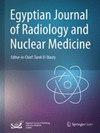Amelanotic melanoma detected by 18F-FDG PET-CT
IF 0.5
Q4 RADIOLOGY, NUCLEAR MEDICINE & MEDICAL IMAGING
Egyptian Journal of Radiology and Nuclear Medicine
Pub Date : 2024-04-04
DOI:10.1186/s43055-024-01238-7
引用次数: 0
Abstract
Amelanotic/hypomelanotic melanoma is an extremely rare cancer and accounts for less than 1/10,000 in the population. For losing and hypomelanotic pigment, amelanotic melanoma can lead to misdiagnosis with benign skin lesions. Therefore, early recognition and diagnosis is important to avoid a delay in treatment. A 73-year-old man presented for a gradually enlarged nodule on the surface skin of the left crus, with no color change, ulceration, or bleeding. Malignant lesion was suspected based on computed tomography (CT) and magnetic resonance imaging (MRI), and biopsy was scheduled. Immunohistochemical (IHC) revealed amelanotic melanoma followed by biopsy.18Florine-fluoro-2-deoxy-2-d-glucose (18F-FDG) positron emission tomography-computed tomography (PET-CT) was employed to explore whether there are metastases or not. 18F-FDG PET-CT showed increased FDG accumulation with standardized uptake value max (SUVmax) of 5.6 of the lesion, and no other lesions were detected. The patient refused to be hospitalized and died 12 months later. This case highlights the need of considering melanoma even if there is no color change. Increased FDG uptake from PET-CT is prone to be consistent with malignant disease as well as whole body scan is crucial in determining the accurate TNM stage. Moreover, prompt treatment according to guidelines is necessary even if the disease is at its early stage.18F-FDG PET-CT 检测到的黑色素瘤
黑色素瘤/黑色素沉着症黑色素瘤是一种极其罕见的癌症,发病率不到 1/10,000。对于色素脱失和色素减退的患者来说,黑色素瘤可能会被误诊为良性皮肤病变。因此,早期识别和诊断对于避免延误治疗非常重要。一名 73 岁的男性因左侧肩胛骨表面皮肤出现逐渐增大的结节而就诊,结节没有颜色变化、溃疡或出血。根据计算机断层扫描(CT)和磁共振成像(MRI),怀疑是恶性病变,并安排了活检。免疫组化(IHC)显示为绒毛状黑色素瘤,随后进行了活组织检查。18F-FDG PET-CT 显示病灶处 FDG 积聚增加,标准化摄取值最大值(SUVmax)为 5.6,未发现其他病灶。患者拒绝住院治疗,12 个月后死亡。该病例强调,即使没有颜色变化,也需要考虑黑色素瘤。PET-CT 的 FDG 摄取增加容易与恶性疾病相一致,而全身扫描对于确定准确的 TNM 分期也至关重要。此外,即使疾病处于早期阶段,也有必要根据指南进行及时治疗。
本文章由计算机程序翻译,如有差异,请以英文原文为准。
求助全文
约1分钟内获得全文
求助全文
来源期刊

Egyptian Journal of Radiology and Nuclear Medicine
Medicine-Radiology, Nuclear Medicine and Imaging
CiteScore
1.70
自引率
10.00%
发文量
233
审稿时长
27 weeks
 求助内容:
求助内容: 应助结果提醒方式:
应助结果提醒方式:


